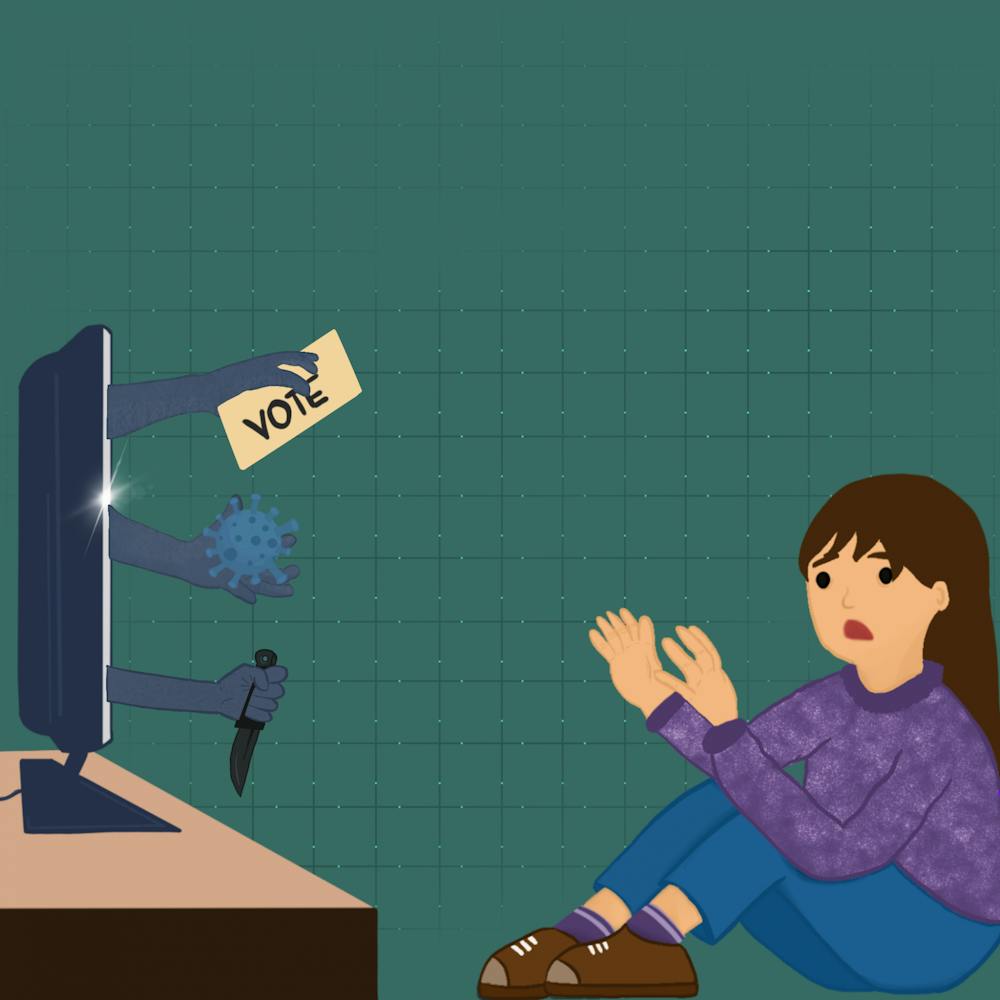中文版请点击此处
The words “horror movie” and “therapy” are not usually found in the same sentence. In fact, horror movies are probably not the first tool people think of when it comes to coping with real-world trauma and anxiety. Especially after enduring a particularly heavy year burdened by violence, death and uncertainty, watching a film that regurgitates those same distressing themes seems off-putting at best. However, a peculiar phenomenon suggests that confronting fears head-on through horror movies — even if you are watching through splayed fingers — may actually be therapeutic and improve fear-response.
To understand this concept, one must first break down fear. How does it operate? The way the mind processes fear is the same as the fight-or-flight response — you can either confront the fear like final girl Laurie does as she fights the masked killer Michael Myers in the 1978 “Halloween,” or you can flee to escape danger like the final girl Sally who runs away from the chainsaw-wielding cannibal, Leatherface, in the 1974 “Texas Chainsaw Massacre.”
In both cases, this response is driven by the sympathetic nervous system, which is made up of a collection of neurons that trail from the spine to the rest of the body. According to National Geographic, when the body perceives danger, it will trigger involuntary reactions such as an increased heart rate and an influx of blood into our muscles in order to physically prepare the body to address the present threat.
When people watch horror movies, this same response mechanism is triggered. The difference? According to Media Studies Lecturer Matthew Marshall, horror movies allow people to experience fear in a controlled environment.
“Film in general, be it horror or other genres, are simulations [and] role-playing of different situations,” Marshall said. “We can safely sit and watch others be confronted by and work out problems that would be hard to solve if you were in the middle of them yourself. The horror film is a sort of workshop for facing and exploring fears.”
For example, when viewers become aware that the threat is not real or that it is no longer dangerous, their bodies go through another set of reactions propelled by the parasympathetic nervous system, which helps them feel a sense of relief or calm. When watching horror movies, the body reacts as if the perceived danger is real, triggering all of the typical involuntary responses like a fast heartbeat or extra blood pumping through one’s veins.
This process of heightening fear and anxiety to then have it wash away with a neurochemically pleasurable feeling of relief is what makes horror movies so therapeutic. A 2018 study found that people who watch horror films may enjoy being scared because it enables them to gain control over their fears from the safety of their homes or movie theaters.
Researchers have seen this same trend play out during the current global pandemic. According to a 2020 study, horror fans have exhibited less psychological distress during the pandemic and “morbidly curious” people have exhibited greater positive resilience. University of Chicago doctorate student Coltan Scrivner suggests that this “morbid curiosity” may motivate people to learn about threatening situations, such as a global pandemic, so they are better prepared to deal with it if it were to arise again.
History is no stranger to this psychological phenomenon. Marshall explains the long-lived relationship between past traumatic world events and horror movie consumption.
“The horror film genre in America was invented by Universal Studios in the early 1930s, with ‘Dracula’ debuting on Feb. 14, 1931, and it flourished during The Great Depression,” Marshall said. “Audiences have always turned to escapism when times are tough. We watch movies to see people behave in ways they can neither afford, be aware of or engage in themselves.”
Marshall also noted that horror author Stephen King’s motivation for writing horror stories is to imagine the worst possible situations, so he can be more prepared if they actually happen.
However, when discussing horror movies as a tool to help individuals cope with trauma, it is critical that one recognizes that the act of creating and even watching horror movies is rooted in privilege.
“You can argue that it is a privilege to have the time and the safety to sit around and imagine horror stories,” Marshall said. “If you are struggling in life, there isn't much incentive to imagine things being worse.”
While horror movies have not been scientifically or officially proven to be successful treatments for certain traumas and phobias, researchers agree that it is possible. That being said, the next time you are settling in to watch your favorite horror movie, or a chilling new release, pay attention to how you feel — chances are, it might be more soothing than you think.







